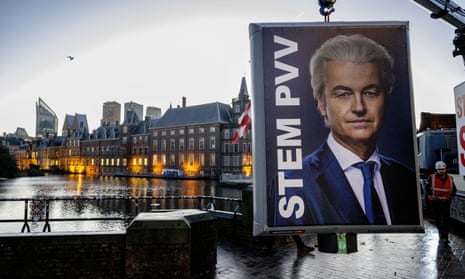As the Netherlands – and European capitals – assess the unexpected outcome of the Dutch election, Geert Wilders is celebrating with cake.

This blog is now closed, you can read more on this story here

As the Netherlands – and European capitals – assess the unexpected outcome of the Dutch election, Geert Wilders is celebrating with cake.

The Austrian Freedom Party’s Harald Vilimsky said he is proud of his political friends, posting a photo with Italy’s Matteo Salvini, France’s Marine Le Pen and the Netherlands’ Geert Wilders.
Bravo, Geert!!!!! Stolz auf meine politischen Freunde und unsere Allianz🙂@matteosalvinimi @geertwilderspvv @MLP_officiel #fpoe #idgroup pic.twitter.com/ierixzu0bt
— Harald Vilimsky (@vilimsky) November 23, 2023

The French far-right leader Marine Le Pen, whose National Rally party is the biggest single opposition party in the French parliament, congratulated Geert Wilders.
Le Pen described Wilders’ Party for Freedom (PVV) as an ally with her party in the European parliament, telling France Inter radio that Wilders’ election performance showed that “more and more countries at the heart of the EU are contesting the way it works ... and want us to master immigration, which is seen by many European peoples as massive and totally anarchic today”.
She said Wilders’ positions on Europe raised the question of what Europe had become: “An obese, technocratic structure that moves forward by sanctions and threats.”
Asked if she backed Wilders’ outrageous style of politics, she said that wasn’t up to her, the parties were different. She said he had sometimes used shock tactics: “That’s his method, that’s his way”.
Le Pen said she felt he had “evolved” on that and that his results were the consequence of a kind of “normalisation”.
The French finance minister, Bruno Le Maire, told Franceinfo radio that Wilders’ showing was a consequence of “all the fears that are emerging in Europe” over immigration and the economy.
But he also said: “The Netherlands are not France.”
"La bonne nouvelle, c'est quand les peuples peuvent s'exprimer !"
— France Inter (@franceinter) November 23, 2023
Marine Le Pen salue la victoire du parti d'extrême droite PVV aux élections législatives néerlandaises. "Geert Wilders et son mouvement sont des alliés du Rassemblement national", dit-elle. #le710inter pic.twitter.com/3XS1aHQU0l
Jan Zahradil, a Czech member of the European parliament and leading figure within the European Conservatives and Reformists Group, said this morning that the “mainstream establishment” has been “left shocked”.
“But if they don’t take this message seriously, other countries will follow suit,” he said, adding:
And the message? Enough migration. Enough Green Deal. Enough Brussels interference.
Geert Wilders decisively won Dutch snap elections. Mainstream establishment left shocked, but if they don’t take this message seriously, other countries will follow suit.
— Jan Zahradil (@ZahradilJan) November 23, 2023
And the message? Enough migration. Enough Green Deal. Enough Brussels interference.
It’s as simple as that. https://t.co/Sdtmm1Eq9F
Hein de Haas, a sociologist at the University of Amsterdam, said today that the VVD’s strategy of focusing the campaign on immigration had backfired and legitimised the far-right candidate Geert Wilders.
Dutch election summary: The leading VVD party had the cabinet fall over asylum and centred the entire campaign on immigration. This strategy backfired as it actually legitimised Wilders, leading him to triumph. As JM Le Pen already said, people vote for the original, not the copy
— Hein de Haas (@heindehaas) November 23, 2023
Alexander Clarkson, a lecturer in German and European studies at King’s College London, said this morning: “Left and right as broader camps each have a substantial presence and will still do so.
“What is constantly shifting is which strand of the right – from far right to far right populists to conservatives to Christian democrats to rightish neo-liberals – is dominant at any one time.”.
He said Geert Wilders, like Jörg Haider in Austria, “has built his success on condemning coalition horsetrading that imposed policy compromise at the expense of ideological purism on every other Dutch party”.
He added:
I suspect the trajectory of Wilders in power would be that of Haider as a populist entirely focused on gaining power yet struggles to use it effectively once it is in his hands rather than that of a canny strategist like Giorgia Meloni.
A characteristic that Far Right populists like Haider, Farage and Wilders share is a desperate hankering after respect from the political establishment they spend their careers condemning.
A characteristic that Far Right populists like Haider, Farage and Wilders share is a desperate hankering after respect from the political establishment they spend their careers condemning
— Alexander Clarkson (@APHClarkson) November 23, 2023
Geert Wilders celebrated this morning as counting showed his far right PVV party took 37 seats – two more than expected in last night’s exit polling and significantly more than predicted in opinion polling during the campaign.
❤️ 37 ZETELS ❤️ pic.twitter.com/kzD6PiiCkQ
— Geert Wilders (@geertwilderspvv) November 23, 2023
Geert Wilders’ far-right, anti-Islam Party for Freedom (PVV) is on course to be the largest party in the Dutch parliament, in a major electoral upset whose reverberations will be felt around Europe.
The PVV, whose manifesto includes calls for bans on mosques, the Qur’an and Islamic headscarves in government buildings, is expected to win 37 seats in the 150-seat parliament, more than double the number it won in the previous ballot in 2021.
However, it is unclear whether Wilders – whose party has finished second and third in previous elections, but always been shut out of government – will be able to win enough support to form a coalition with a working parliamentary majority.
“I call on the parties,” Wilders said in an initial reaction after the vote. “The campaign is over and the voters have spoken. Now we will have to look for agreements with each other.”
He insisted in his victory speech that he was “confident we can reach an agreement”, adding: “I understand perfectly well we should not take any measures that would be unconstitutional.”
Far-right figures across Europe, including Hungary’s Viktor Orbán, France’s Marine Le Pen, Matteo Salvini in Italy, and Germany’s AfD rushed to congratulate the PVV leader.
The heads of the three other biggest Dutch parties have all said they would not serve in a PVV-led cabinet.
Jon Henley, Pjotr Sauer and Senay Boztas
With nearly all votes counted, preliminary results in the Dutch election show Geert Wilders’ far-right Party for Freedom (PVV) took 37 seats, more than any other party and significantly more than expected in opinion polling during the campaign.
A GreenLeft-Labour party alliance (GL/PvdA) led by the former EU commissioner Frans Timmermans finished second with 25 seats.
The liberal-conservative Party for Freedom and Democracy (VVD), led by the outgoing justice minister, Dilan Yeşilgöz-Zegerius, got 24 seats.
Much will now depend on a coalition-building process.

Welcome back to the Europe blog.
Send thoughts and tips to lili.bayer@theguardian.com.